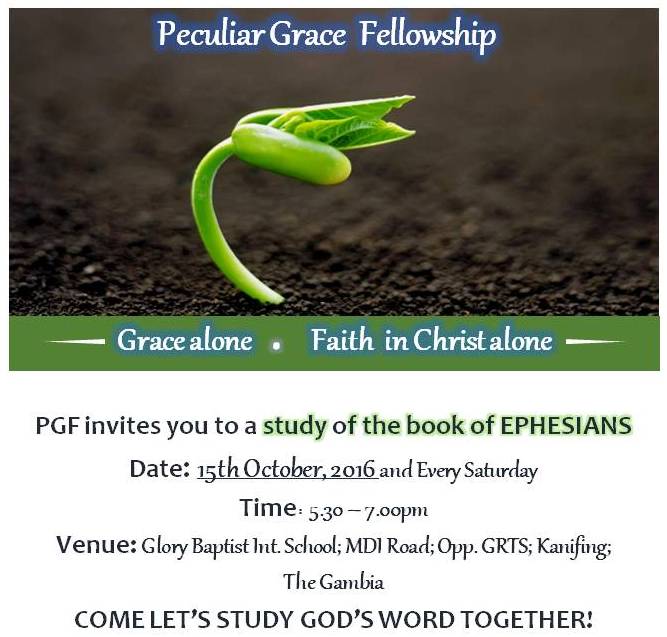
To the saints who are in Ephesus, and are faithful in Christ Jesus: Grace to you and peace from God our Father and the Lord Jesus Christ (Ephesians 1:1-2).
Introduction:
I remember the letters I used to write to my ‘pen pals’ in my secondary school days. They began something like this:
“Dear [Recipient], The brightness of the day has given me the opportunity to pen this missive to you…” As I matured, my salutations grew in simplicity. These days, I simply start with “Dear [Recipient], or if I’m writing to someone I know particularly well, I would say “Hello [Recipient]” and continue along the lines of “I hope my message finds you well…”
Most letters (or email communications) nowadays begin similarly. It is almost invariably a given in both formal and personal correspondences to give a quick shout-out to the recipient and find out how they are doing before proceeding to say what the real purpose for writing is. Thus, it is easy to gloss over the first few lines of a letter, such as the ones we find in our New Testament.
At first glance, the introductory salutation of Paul’s letter to the Ephesians may appear as a customary formality. However, within these verses lie profound truths that should not be overlooked. Encapsulated in the three terms Paul uses to describe the Ephesians – ‘saints’, ‘faithful’, and ‘in Christ’ – we find what, I believe, is the irreducible minimum definition of a Christian. In this article, we will delve into each term, exploring their implications and gaining a deeper understanding of what it truly means to be a Christian.
A Christian is a Saint
The first term that Paul employs to describe the Ephesians is “saint.” This designation challenges the popular notion that saints are a select group of exceptional Christians who occur sporadically throughout history. The New Testament teaches that every believer in Christ is a saint. The term “saint” is used repeatedly throughout the New Testament, often in the plural sense.
The word “saint” denotes someone who has been called out and separated. As the Church, we are set apart as God’s own possession, just as the nation of Israel was in the Old Testament. Peter, in the second chapter of his epistle to the Christians in exile, describes his recipients in the same terms as God used to describe the nation Israel in the Old Testament – a people set apart as God’s peculiar possession and treasure (Exodus 19:6; Deuteronomy 7:6; 14:2; Isaiah 43:21).
This plays out in two ways. Positionally, we are sanctified (a term which the Bible uses synonymously to being ‘set apart’ or ‘separated’) as a result of the righteousness of Christ being imputed to us through our union with him (Isaiah 61:3,10). That is why the Bible describes believers with terms such as “you are holy” and “you are sanctified” (1 Corinthians 6:11, Hebrews 3:1, 1 Corinthians 1:2, 30; Romans 8:30).
At the same time, functionally, we are called to be saints (1 Corinthians 1:2); i.e., to live holy lives because we now have a new nature, which, as Paul puts it, is “created after the likeness of God in true righteousness and holiness” (Ephesians 4:24). The believer is, thus, said to have a new disposition which is inclined to “do good works, which God prepared beforehand that we should walk in them” (Ephesians 2:10).
Consequently, one cannot claim to have been spiritually reborn (saved) without any accompanying evidence of an upward progression in holiness. The reformed teacher, R. C. Sproul, in his book “The Holiness of God”, put it like this:
“If we say we have faith, but no works follow, that is clear evidence that our faith is not genuine. True faith always produces real conformity to Christ. If justification happens to us, then sanctification will surely follow. If there is no sanctification, it means that there never was any justification.”
C.H. Spurgeon noted,
“Another proof of the conquest of a soul for Christ will be found in a real change of life. If the man does not live differently from what he did before, both at home and abroad, his repentance needs to be repented of, and his conversion is a fiction.”
We are no longer identified by our past sins and failures but are transformed and set apart by the grace of God. In understanding our identity as saints, we recognise that it is not by our own merit but by God’s grace that we have been called out and separated for His purposes. And we instinctively hate the sin we used to love, and, to borrow Spurgeon’s words, “pine after holiness and pant after conformity to God”.
A Christian is Faithful
Paul’s second term emphasises the importance of faith in the life of a Christian. In the first instance, it highlights the truth that we are saved solely by placing faith in Christ. Being faithful (full of faith) means exercising unwavering trust and belief in the Lord Jesus Christ. This definition leaves no room for any contribution to our salvation on our part. It is purely the Sovereign act of God (Ephesians 2:8-10). As the great Christian philosopher Jonathan Edwards said, “We contribute nothing to our salvation but the sins that made it necessary.”
The Christian faith centres on believing certain truths. Acts 20:21 summarises the content of the gospel thus: “repentance toward God, and faith in the Lord Jesus Christ”. Therefore, the first focus of the Christian faith is the Lord Jesus Christ. A Christian is one who affirms that Jesus is Lord. To declare that Jesus is Lord is to declare that one believes all that is true about His person, including the fact that He is God.
To believe that Jesus is Lord is thus to affirm one’s belief in the fact that He is co-equal and co-eternal with God the Father, and as the second person of the Trinity, the One who took on human flesh and was born of a virgin into this world in order to die to save us from sin. This encompasses affirming the doctrine of the Trinity, because the Bible teaches that the virgin birth was only possible by the supernatural power of the Holy Spirit (Matthew 1:18, 20; Luke 1:35).
To be faithful also means that a Christian can be relied upon. It is not simply a matter of belief; genuine faith reveals itself in faithfulness, especially during persecution and trials. T
hroughout history, countless men and women have demonstrated remarkable faithfulness, even in the face of severe opposition. Their unwavering commitment to Christ and refusal to renounce their faith are inspiring examples of faithfulness amid adversity. Fox’s book of Martyrs recounts the stories of martyrs like Polycarp, who chose death rather than denying their Lord, and testify to the enduring power of faith in the life of a Christian.
A Christian is In Christ
The phrase “in Christ” is one of the most common descriptions of believers in the New Testament. It signifies the profound union between Christ and the believer. Just as humanity was united with Adam in the fall, believers are now joined with Christ through faith. This union is a miraculous work of God, by which we are adopted into the body of Christ as God’s children and therefore joined to all other believers who are part of God’s body.
Apart from Christ, there is no true life, and all the blessings Christians enjoy flow through Him. Being “in Christ” means that our identity and worth are derived from our union with Christ rather than from any worldly measure. In Christ, we find our purpose, our strength, and our hope. Through this union, we are transformed from sinners to saints, from alienation to reconciliation, and from death to life.
This description of the believer also conveys a potent truth about the security of our salvation. This is suggested in the analogy the Bible uses to describe our union with Christ and other believers, namely, the body. For example, the union between the hand and the shoulder is intrinsic, organic and vital, such that the hand cannot separate itself from the shoulder. The two are inseparably joined in the way that the body is designed.
Similarly, one cannot be ‘unjoined’ from Christ, the same way that one cannot be ‘unborn’. Once in Christ, we are inseparable from Him. He promises never to forsake us (Hebrews 13:5), and nothing can separate us from His love (Romans 8:28-30). He keeps all those He saves till the very end because no one can snatch them from His hand (John 10:28-:29; 1 Peter 1:3-5).
Grace and Peace: The Essence of the Christian Faith
Paul’s salutation concludes with the invocation of grace and peace. Grace, defined as unmerited favour, is the foundation of the Christian faith. It is God’s divine enablement that brings about salvation and transforms believers into saints. Grace cannot be earned or deserved; it is a gift freely given by God to all who believe in Him. Through grace, we are redeemed and forgiven of our sins, and we experience the transforming power of God’s love (Ephesians 1:7).
Peace, on the other hand, goes beyond the absence of conflict and denotes reconciliation with God and fellow human beings. This reconciliation is made possible through Christ’s work on the cross. Through His sacrificial death, He broke down the walls of hostility and made peace between God and humanity (Ephesians 2:13-19). The peace that surpasses all understanding is not merely the absence of chaos and conflict but the restoration of harmony and wholeness in our relationship with God.
The phrase “grace and peace” carries a profound meaning that summarises the entire Christian faith. Grace is the beginning of our faith, and peace is the end result. Grace is the source of everything that we are and have as Christians. That is why Paul, in every one of his epistles, always starts and ends with it. We are saved by grace through faith, and it is by God’s grace that we experience true peace – peace with God, peace within ourselves, and peace with others.
Conclusion
In the introductory verses of Paul’s letter to the Ephesians, we discover the irreducible minimum definition of a Christian. A Christian is a saint, a faithful believer, and one who is in Christ. These terms encapsulate the essence of the Christian faith, highlighting the unity, grace, and peace that believers experience through their relationship with Jesus Christ. May we treasure these truths and live them out in our daily lives as we embrace our identity as Christians. Grace and peace to you, dear Saint!



The Lord bless and keep us safe, we thank Him for His grace which abounds for us all!